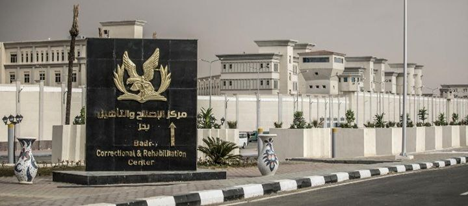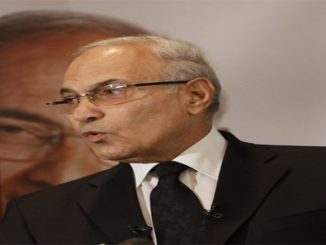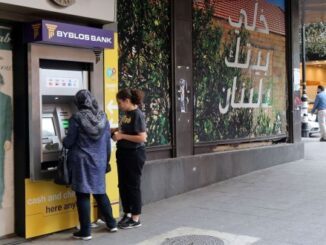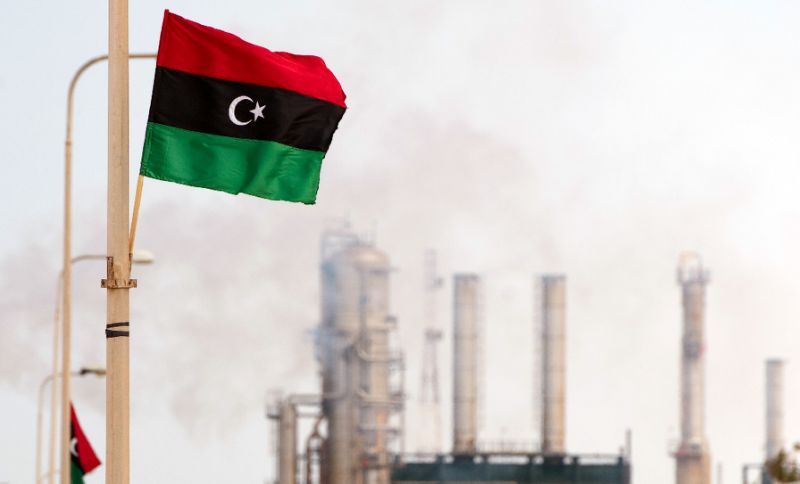
A series of leaked videos from inside one of Egypt’s newly constructed prisons has raised serious concerns among rights groups and activists about the conditions of political prisoners, including lack of medical attention, solitary confinement, and bans on family visits.
On Monday, a US-based Egyptian social media influencer, Aly Mahdy, posted a video showing the cells of senior leaders of the Muslim Brotherhood in the Badr prison complex.
The videos that were leaked cement what rights groups and Egyptian activists have been warning about for months: that the conditions inside the Badr prison are deplorable and that inmates are suffering from cruel treatment, including medical neglect.
Two of the videos also appear to show that the inmates’ bedding only consists of a thin mat that is placed on the floor, while all of the leaked footage shows each inmate is alone.
“The videos confirm what we have heard from families regarding dire conditions of detainment. The violations in Badr are part and parcel of a justice system that lacks transparency, due process, and accountability,” Amr El-Afifi, research manager at the Freedom Initiative stated.
The Freedom Initiative further called on the Egyptian government to allow international bodies to come in and investigate the conditions within the country’s prison system.
MB comments on the leaked video clips
The Muslim Brotherhood has condemned the abuses against political prisoners in Egyptian prisons, particularly the group leaders, after the latest circulated leaked footage from the prison
The acting MB general guide Dr. Salah Abdel-Haq on Tuesday issued a statement slamming the Egyptian authorities for the human rights violations against political detainees in Egyptian prisons, including MB leaders, in the wake of the leaked footage circulated in social media.
“The Muslim Brotherhood has followed up on the footage that was disseminated (in social networking sites) concerning some political detainees in Egyptian prisons. These video clips highlight the authorities’ violation of the rights of detainees and prisoners and provide new evidence about their poor conditions that have claimed the lives of hundreds among them,” the statement read.
“The MB confirms that the international community is fully aware that since July 2013, the issue of detainees in Egypt is primarily a political issue, based on discrimination against an integral faction of the Egyptian people, simply because it came to power through democratic elections,” the statement added.
The Brotherhood confirmed that the crisis in Egypt is fundamentally political; and suggested that the solution starts with undertaking political reform and societal reconciliation and dismissing division and discrimination.

The MB confirmed that societal reconciliation starts with releasing all political detainees and addressing the societal rift.
The group called for unity of the Egyptian people in the battle for development and construction so that Egypt would restore its strength, as it had used to.
The statement emphasized maintaining the MB’s peaceful approach and the group’s constitutional and legal struggle on demanding the freedom and rights of detainees, despite the abuses practiced against them in violation of domestic and international law and human rights conventions.
The MB also emphasized that the sacrifices provided by detainees, particularly the group’s leaders, ministers, and members of parliament, are “a tax paid by the group for the freedom of the Egyptian people, and a price for their pride and dignity”.
After the Brotherhood-affiliated former president Mohamed Morsi was ousted by Abdel Fattah al-Sisi, thousands of the group’s members have been detained, killed, or forced to live in exile for fear of persecution at home.
President Morsi himself died in a courtroom in June 2019 after being held in solitary confinement for six years, in what UN experts described as “state-sanctioned arbitrary killing”.
Since 2014, Sisi has built at least 28 new prisons – more than a third of the total number of prisons in Egypt, now estimated to be 81.
The Badr prison complex, located northeast of Cairo, came about as a result of a new policy launched by Sisi in September 2021. The plan, titled the National Human Rights Strategy, included modernizing the country’s detention facilities.
Soon afterward, Cairo opened Badr and Wadi el-Natrun, two large prison complexes, and began relocating political prisoners there.
The Badr prison is home to three different prisons including Badr 3, where many high-profile political prisoners have been held after being transferred from the notorious Tora Prison complex – which includes the maximum-security Scorpion prison – in 2022.
Sisi promoted the new prison facilities as a model in human rights compliance, but rights groups have criticized them for falling short of international standards and for being worse than the previous prisons where political detainees were being held.
“Our documentation indicates that Badr prison is more notorious than the infamous Scorpion prison,” Afifi said.
“The same officers who oversaw torture at the Scorpion prison moved to Badr. The new buildings came with even worse practices.”
Till the Last Prisoner, a campaign led by human rights defenders and families of detainees calling for the release of political prisoners in Egypt, released a statement following the leaked footage, stating that it had been monitoring the “ongoing deliberate bans imposed by prison management on access to basic necessities” inside the prison.
The group also noted that surveillance lights and cameras are in operation 24/7 and that many prisoners suffer from a lack of medical care. Till the Last Prisoner said there have been eight recorded deaths in the prison due to “deliberate medical neglect”.
“Prisoners in Badr continue to be held in cruel, inhumane, and punitive conditions,” the campaign said in a statement.
“From the moment the prisoners were transferred to Badr prison, messages and pleas have continuously highlighted the dire conditions of detainment, including systematic collective torture, with some describing the situation as ‘worse than Scorpion prison a thousand times over’.”
The group also noted that prisoners are denied communication with their families and lawyers, and several families of detainees reported that their visits “do not exceed 20 minutes and were conducted in the presence of guards and prison staff”.
Meanwhile, Amnesty International has documented that prisoners in the Badr 3 prison are held in “cruel and inhumane conditions”.
“Detainees shiver in cold cells with fluorescent lights switched on round the clock,” Amnesty said in a report in October. “CCTV cameras are trained on them at all hours; and access to basic necessities such as sufficient food, clothing, and books is banned.
“They are denied any contact with their families or lawyers and detention renewal hearings are held online.”
Amnesty decried Egyptian efforts to paint the prison as turning a page on the country’s poor prison culture.
While the prison was opened to “great fanfare by the authorities”, in reality, Amnesty said, “prisoners are facing the same human rights violations that have repeatedly blighted older institutions, exposing the lack of a political will from the Egyptian authorities to bring an end to the human rights crisis in the country”.
Egyptian jails hold an estimated 65,000 political prisoners, arrested for their opposition to the Sisi’s government, according to a study released by the Arabic Network for Human Rights in March 2021.
Hundreds of people have perished in prison since Sisi’s coup, due to medical negligence and lack of an urgent care system when a detainee suffers a medical emergency, including Morsi and former MP Essam el-Erian.



